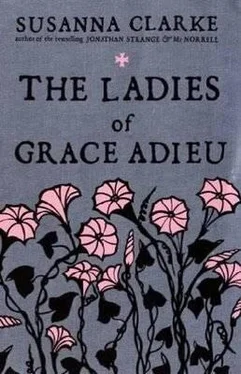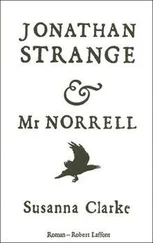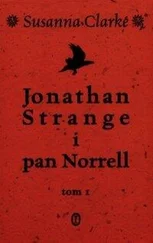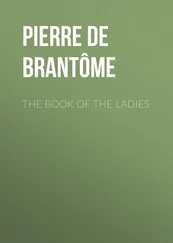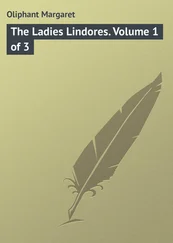By two o'clock Tom and David had reached Nottinghamshire, [5]a county which is famous for the greenwood which once spread over it. Of course at this late date the forest was no longer a hundredth part of what it once had been, but there were still a number of very ancient trees and Tom was determined to pay his respects to those he considered his particular friends and to shew his disdain of those who had not behaved well towards him. [6]So long was Tom in greeting his friends, that David began to be concerned about Mr Monkton.
"But you said he was not really ill," said Tom.
"That was not what I said at all! But whether he is or not, I have a duty to reach him as soon as I can."
"Very well! Very well! How cross you are!" said Tom. "Where are you going? The road is just over there."
"But we came from the other direction."
"No, we did not. Well, perhaps. I do not know. But both roads join up later on so it cannot matter in the least which we chuse."
Tom's road soon dwindled into a narrow and poorly marked track which led to the banks of a broad river. A small, desolate-looking town stood upon the opposite bank. The road reappeared on the other side of the town and it was odd to see how it grew broader and more confident as it left the town and travelled on to happier places.
"How peculiar!" said Tom. "Where is the bridge?"
"There does not seem to be one."
"Then how are we to get across?"
"There is a ferry," said David.
A long iron chain stretched between a stone pillar on this side of the river and another pillar on the opposite bank. Also on the other side of the river was an ancient flat-bottomed boat attached to the chain by two iron brackets. An ancient ferryman appeared and hauled the boat across the river by means of the chain. Then Tom and David led the horses on to the boat and the ancient ferryman hauled them back over.
David asked the ferryman what the town was called.
"Thoresby, sir," said the man.
Thoresby proved to be nothing more than a few streets of shabby houses with soiled, dusty windows and broken roofs. An ancient cart was abandoned in the middle of what appeared to be the principal street. There was a market cross and a marketplace of sorts – but weeds and thorns grew there in abundance, suggesting there had been no actual market for several years. There was only one gentleman's residence to be seen: a tall old-fashioned house built of grey limestone, with a great many tall gables and chimneys. This at least was a respectable-looking place though in a decidedly provincial style.
Thoresby's only inn was called The Wheel of Fortune. The sign shewed a number of people bound to a great wheel which was being turned by Fortune, represented here by a bright pink lady wearing nothing but a blindfold. In keeping with the town's dejected air the artist had chosen to omit the customary figures representing good fortune and had instead shewn all the people bound to Fortune's wheel in the process of being crushed to pieces or being hurled into the air to their deaths.
With such sights as these to encourage them, the Jew and the fairy rode through Thoresby at a smart trot. The open road was just in sight when David heard a cry of "Gentlemen! Gentlemen!" and the sound of rapid footsteps. So he halted his horse and turned to see what was the matter.
A man came running up.
He was a most odd-looking creature. His eyes were small and practically colourless. His nose was the shape of a small bread roll, and his ears – which were round and pink – might have been attractive on a baby, but in no way suited him. But what was most peculiar was the way in which eyes and nose huddled together at the top of his face, having presumably quarrelled with his mouth which had set up a separate establishment for itself halfway down his chin. He was very shabbily dressed and his bare head had a thin covering of pale stubble upon it.
"You have not paid the toll, sirs!" he cried. "What toll?" asked David.
"Why! The ferry toll! The toll for crossing the river."
"Yes. Yes, we have," said David. "We paid the man who carried us across the river."
The odd-looking man smiled. "No, sir!" he said. "You paid the fee, the ferryman's penny! But the toll is quite another thing. The toll is levied upon everyone who crosses the river. It is owed to Mr Winstanley and I collect it. A man and a horse is sixpence. Two men and two horses is twelvepence."
"Do you mean to say," said David in astonishment, "that a person must pay twice to come to this miserable place?"
"There is no toll, David," said Tom airily. "This scoundrel merely wishes us to give him twelvepence."
The odd-looking man continued to smile, although the expression of his eyes had rather a malicious sparkle to it. "The gentleman may insult me if he wishes," he said. "Insults are free. But I beg leave to inform the gentleman that I am very far from being a scoundrel. I am a lawyer. Oh, yes! An attorney consulted by people as far afield as Southwell. But my chief occupation is as Mr Winstanley's land agent and man of business. My name, sir, is Pewley Witts!"
"A lawyer?" said David. "Oh, I do beg your pardon!"
"David!" cried Tom. "When did you ever see a lawyer that looked like that? Look at him! His rascally shoes are broken all to bits. There are great holes in his vagabond's coat and he has no wig! Of course he is a scoundrel!" He leant down from his tall horse. "We are leaving now, scoundrel. Goodbye!"
"These are my sloppy clothes," said Pewley Witts sullenly. "My wig and good coat are at home. I had no time to put them on when Peter Dawkins came and told me that two gentlemen had crossed by the ferry and were leaving Thoresby without paying the toll – which, by the bye, is still twelvepence, gentlemen, and I would be much obliged if you would pay it."
A devout Jew must discharge his debts promptly – however inadvertently those debts might have been incurred; a gentleman ought never to procrastinate in such matters; and, as David considered himself to be both those things, he was most anxious to pay Pewley Witts twelvepence. A fairy, on the other hand, sees things differently. Tom was determined not to pay. Tom would have endured years of torment rather than pay.
Pewley Witts watched them argue the point back and forth. Finally he shrugged. "Under the circumstances, gentlemen," he said, "I think you had better talk to Mr Winstanley."
He led them to the tall stone house they had noticed before. A high stone wall surrounded the house and there was a little stone yard which was quite bare except for two small stone lions. They were crudely made things, with round, surprized eyes, snarls full of triangular teeth, and fanciful manes that more resembled foliage than fur.
A pretty maidservant answered the door. She glanced briefly at Pewley Witts and David Montefiore, but finding nothing to interest her there, her gaze travelled on to Tom Brightwind who was staring down at the lions.
"Good morning, Lucy!" said Pewley Witts. "Is your master within?"
"Where else would he be?" said Lucy, still gazing at Tom.
"These two gentlemen object to paying the toll, and so I have brought them here to argue it out with Mr Winstanley. Go and tell him that we are here. And be quick about it, Lucy. I am wanted at home. We are killing the spotted pig today."
Despite Pewley Witts' urging, it seemed that Lucy did not immediately deliver the message to her master. A few moments later from an open window above his head, David heard a sort of interrogatory murmur followed by Lucy's voice exclaiming, "A beautiful gentleman! Oh, madam! The most beautiful gentleman you ever saw in your life!"
"What is happening?" asked Tom, drifting back from his examination of the lions.
"The maid is describing me to her mistress," said David.
Читать дальше
